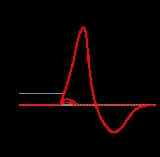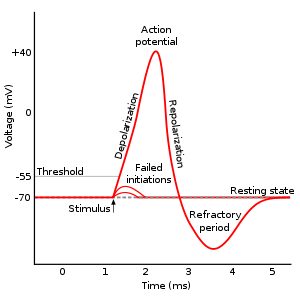
Refractory period
Encyclopedia

Physiology
Physiology is the science of the function of living systems. This includes how organisms, organ systems, organs, cells, and bio-molecules carry out the chemical or physical functions that exist in a living system. The highest honor awarded in physiology is the Nobel Prize in Physiology or...
, a refractory period is a period of time during which an organ or cell is incapable of repeating a particular action, or (more precisely) the amount of time it takes for an excitable membrane to be ready for a second stimulus once it returns to its resting state following an excitation. It most commonly refers to electrically excitable muscle cells or neurons.
Electrochemical usage
- See also: Action potentialAction potentialIn physiology, an action potential is a short-lasting event in which the electrical membrane potential of a cell rapidly rises and falls, following a consistent trajectory. Action potentials occur in several types of animal cells, called excitable cells, which include neurons, muscle cells, and...
After initiation of an action potential, the refractory period is defined two ways:
- The absolute refractory period is the interval during which a second action potential absolutely cannot be initiated, no matter how large a stimulus is applied.
- The relative refractory period is the interval immediately following during which initiation of a second action potential is inhibited but not impossible.
The absolute refractory period coincides with nearly the entire duration of the action potential. In neurons, it is caused by the inactivation of the Na+ channels that originally opened to depolarize the membrane. These channels remain inactivated until the membrane hyperpolarizes. The channels then close, de-inactivate, and regain their ability to open in response to stimulus.
The relative refractory period immediately follows the absolute. As voltage-gated potassium channel
Voltage-gated potassium channel
Voltage-gated potassium channels are transmembrane channels specific for potassium and sensitive to voltage changes in the cell's membrane potential. During action potentials, they play a crucial role in returning the depolarized cell to a resting state....
s open to terminate the action potential by repolarizing the membrane, the potassium conductance of the membrane increases dramatically. K+ ions moving out of the cell bring the membrane potential closer to the equilibrium potential for potassium. This causes brief hyperpolarization of the membrane, that is, the membrane potential becomes transiently more negative than the normal resting potential. Until the potassium conductance returns to the resting value, a greater stimulus will be required to reach the initiation threshold for a second depolarization. The return to the equilibrium resting potential marks the end of the relative refractory period.
Cardiac refractory period

In the classical sense, the cardiac refractory period is separated into an absolute refractory period and a relative refractory period. During the absolute refractory period, a new action potential cannot be elicited. During the relative refractory period, a new action potential can be elicited under the correct circumstances.
Neuronal refractory period
The refractory period in a neuronNeuron
A neuron is an electrically excitable cell that processes and transmits information by electrical and chemical signaling. Chemical signaling occurs via synapses, specialized connections with other cells. Neurons connect to each other to form networks. Neurons are the core components of the nervous...
occurs after an action potential
Action potential
In physiology, an action potential is a short-lasting event in which the electrical membrane potential of a cell rapidly rises and falls, following a consistent trajectory. Action potentials occur in several types of animal cells, called excitable cells, which include neurons, muscle cells, and...
and generally lasts one millisecond. An action potential consists of three phases.
Phase one is depolarization. During depolarization, voltage-gated sodium ion channels open, increasing the neuron's membrane conductance for sodium ions and depolarizing the cell's membrane potential (from typically -70 mV toward a positive potential). In other words, the membrane is made less negative. After the potential reaches the activation threshold (-55 mV), the depolarization is actively driven by the neuron and overshoots the equilibrium potential of an activated membrane (+40 mV).
Phase two is repolarization. During repolarization, voltage-gated sodium ion channels inactivate (different than the close state) due to the now-depolarized membrane, and voltage-gated potassium channels activate (open). Both the closing of the sodium ion channels and the opening of the potassium ion channels act to repolarize the cell's membrane potential back to its resting membrane potential.
When the cell's membrane voltage undershoots its resting membrane potential (near -60mV), the cell enters a phase of hyperpolarization. This is due to a larger-than-resting potassium conductance across the cell membrane. This potassium conductance eventually drops and the cell returns to its resting membrane potential.
The refractory periods are due to the inactivation property of voltage-gated sodium channels and the lag of potassium channels in closing. Voltage-gated sodium channels have two gating mechanisms, the activation mechanism that opens the channel with depolarization and the inactivation mechanism that closes the channel with repolarization. While the channel is in the inactive state, it will not open in response to depolarization. The period when the majority of sodium channels remain in the inactive state is the absolute refractory period. After this period, there are enough voltage-activated sodium channels in the closed (active) state to respond to depolarization. However, voltage-gated potassium channels that opened in response to depolarization do not close as quickly as voltage-gated sodium channels return to the active closed state. During this time, the extra potassium conductance means that the membrane is at a higher threshold and will require a greater stimulus to cause action potentials to fire. This period is the relative refractory period.

